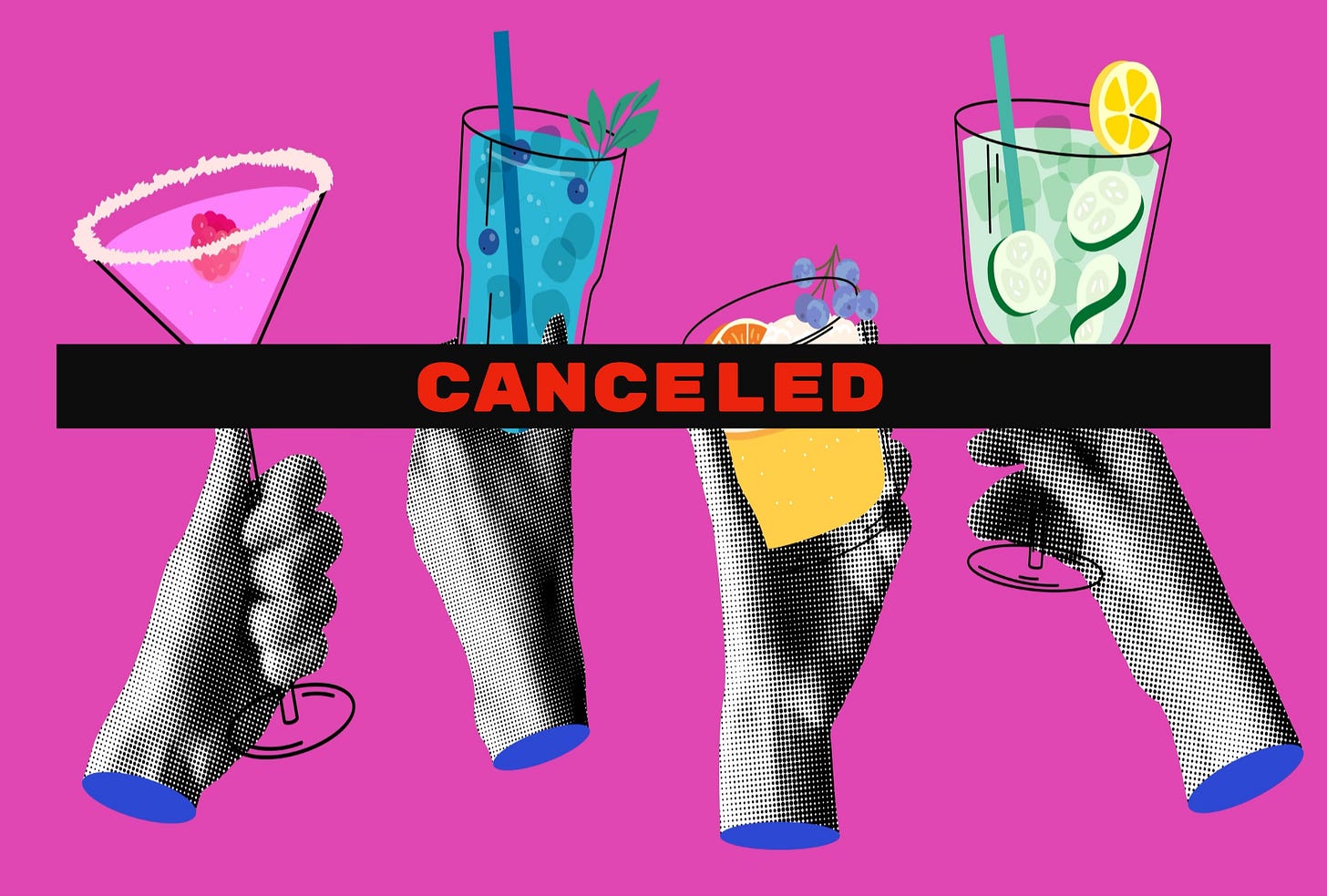Trump’s Tariffs Won’t Even Let You Drink Your Way Through these Tough Times
Exotic cocktail ingredients are about to become pricier or disappear from the market altogether
One evening last week I came home and mixed myself a cocktail. That night it was a riff on a martini. I started with a bottle of Botanist gin, which is distilled in Scotland with a broad range of local botanicals like apple mint, birch leaf, and heather. Then came the vermouth, a crisp and delicate Dolin dry, which is a historic brand from Chambéry, France. To make things interesting, I also added a splash of Kota, a new liqueur flavored with southeast Asian pandan leaves, which is distilled in France and developed by a renowned mixologist with bars in Paris and New York City.
The cocktail turned out wonderfully, the pandan liqueur lending pleasant sesame and grassy notes to the standard martini. Unfortunately, the drink may also soon become more expensive. Every drop of it, having come from abroad, is suddenly subjected to higher tariffs. That won’t necessarily raise the price of these specific bottles immediately, but added costs will inevitably make their way through the drinks supply chain.
Working with imported spirits is my day job—which has turned reading the news into a daily bout with anxiety. Despite the haphazard implementation of his tariff agenda thus far, every time Trump threatens a new wave of tariffs I wonder what it could mean for my employment—whether I’ll still be employed as these sudden taxes rapidly ravage industries that rely on imports. Under Trump’s tariff regime, many of the bottles that it’s my job—for now—to sell will rise in price, as will all kinds of other consumer goods. Some commodities, like the price of eggs, are easy to track. Other losses will be less visible—or unseen, as French economist Frédéric Bastiat famously observed: these are the products that importers decide are no longer worth bringing to the United States at all, or the ones that never get created in the first place because the potential market has been destroyed.
Take Sichuan pepper. Banned for decades in the United States due to fears that it would introduce a blight to American citrus crops, it was legalized in 2005. For years the Sichuan pepper that I’d buy at Asian grocers was disappointing, with sharp thorns that had to be sorted from the bag, hard seeds that crunched unpleasantly in the dish, and lackluster flavor. Then in 2017 I ordered my first bag from a new specialty importer called Mala Market, triple the cost of what I’d pay at the store but with a promise of exceptional quality. Cooking with these was like switching from grayscale to full-spectrum color, with explosions of fragrance and flavor and the intense numbing effect for which Sichuan pepper is famous. Now I can’t imagine going back to cooking with the old stuff.
But I might have to. “Starting tomorrow, the tariffs on the 50+ products we import will range from 112% to 147%,” the company posted on their Instagram page earlier this month. “How are we supposed to deal with that? I have no idea.” That post was already obsolete a day later when Trump announced even higher tariffs on goods from China. Who knows what the rate will be tomorrow or next week or a year from now?
I hope Mala Market will manage to hang on in the face of exorbitant tariffs. If they do, I suspect I’ll be paying a lot more for my next shipment of Sichuan ingredients. But paying higher prices is the optimistic scenario. The worse possibility is that higher prices can’t sustain the business at all. Terrible for them, and disappointing for all the customers whose lives have been improved, if only in a small way, by their excellent imports.
Some products affected by Trump’s tariffs can be made domestically, though we’d still be better off importing them from elsewhere. Others simply won’t be made here at any kind of scale. Take coffee. Hawaii is the only state with a climate suitable for growing it commercially, and it can’t come close to satisfying our national thirst. We simply have to import it. What Trump has done, then, is effectively raised taxes on all of our morning cups.
That means we’ll be paying more. We’ll also be getting less. I don’t expect the economic turmoil to be so dire that we have to resort to brewing chicory root, a common substitute during past times of war and barriers to trade, but we’ll likely have less variety to choose from. Tariffs are an obvious blow to roasters working to introduce coffees from emerging origins to the U.S. Some of the most intriguing coffees I’ve tried in recent years have come from Asia, including China and Vietnam; the latter faces tariffs of 46% when the current “pause” expires in July.
Although Trump’s temporary suspension of his own tariffs is a welcome reprieve, our current tariff levels remain at a substantial step up from the status quo before Trump. The U.S. is still burdened by 10% baseline tariffs, even imposed on the goods of countries with whom we have a trade surplus. Cars, steel, and aluminum, and some imports from Mexico and Canada, face higher rates still. And goods from China, our third largest trading partner, will be taxed at 145%. The chaos alone can cause prices to rise in anticipation. See, for example, the market for green coffee, which is breaking contemporary records.
We often think about tariffs as merely increasing prices, which is certainly bad enough. But you can also think of them as forcing regression to a less prosperous time. One of the most notable ways American life has improved in recent decades is our abundance of higher quality and more varied food and drink. Tariffs threaten to reverse that progress.
Consider, again, the cocktail. Whatever Trump means by making America great again, he certainly wasn’t talking about the drinks. It’s worth looking back on what the market for cocktail ingredients was like just 20 years ago. Ingredients we take for granted now were completely unobtainable then. When I started tending bar in 2007, I could get my hands on only two types of bitters, Angostura and Peychaud’s. Orange bitters were a seemingly mythical thing that existed only in the pages of books. It was a thrill to find them at a bar in New York City, even more so when the bartender sold me a bottle to bring home in my suitcase. Today I can walk into any Whole Foods and find a selection of bitters wider than I could only dream of then.
Much of the credit for those changes goes to specialty importers who saw the budding interest in forgotten spirits and set about bringing them to the United States. If you’ve enjoyed cocktails made with esoteric ingredients like crème de violette, Batavia arrack, or allspice dram, you’ve benefited from our openness to international trade and the entrepreneurs putting their money on the line to import unknown products. That’s a more difficult venture in the current environment, in which the risks of importing an obscure spirit are magnified by the increased cost of tariffs, the loss of discretionary income among consumers, and the uncertainty of dealing with a president who changes tax rates chaotically via posts on social media.
This is pretty basic economics dating back to Adam Smith, who famously noted in The Wealth of Nations that “the division of labour is limited by the extent of the market.” In a small market like a single town, one must be a generalist. The larger the market, the more potential there is to specialize in niche goods and services. By isolating the United States from global trade, we risk making some specialized commerce unviable. As the founders of the spice company Burlap and Barrel explained their tariff response to Eater, “it’s going to be a lot less innovation: leaning on our existing lineup, focusing on things that we know that there’s a market for, and taking fewer risks with new products, niche products, or things that might be unfamiliar to the American market.”
And it’s not just food and drink, of course. It’s board games. It’s bicycles. It’s violins. Whatever your hobbies and interests, prohibitively high tariffs would make some related products more expensive and others flat-out unavailable. “Luxury goods have what economists called elastic demand, meaning that consumers will reduce their spending substantially from price increases,” Jeremy Horpedahl, an associate professor of Economics at the University of Central Arkansas and adjunct scholar at the Cato Institute, explained to me. “If luxury imported goods are subject to tariffs in the U.S., producers might choose to reallocate some of their supply to non-U.S. markets where consumers will still buy them.”
Obviously, the effects of tariffs on luxury goods and esoteric spices are far from the greatest danger posed by the Trump administration, and I admit to feeling some unease even writing about the subject while innocent people are being shipped off to a gulag in El Salvador. But the loss of specialty products will be a real loss to consumers, and if tariffs are left in place they will be genuinely devastating to small business owners who may see their lifelong careers blown up in an instant by the recklessness of our impetuous and economically illiterate president. I feel awful for them.
Trump’s tariffs are terrible economics. They threaten to raise the price of essential commodities, of life-saving drugs, of new cars and housing. They are going to make us measurably poorer. They will also make us poorer in less measurable ways, through all the little things that get more expensive, that disappear from the market, or that we never realize we’re missing because no one bothers bringing them to America at all: the obscure liqueur in the new cocktail that would make us smile, the unique coffee unlike any we’ve ever tasted, the perfect spice that would elevate our cooking in ways we didn’t know were possible. Trump’s tariffs are a tax on our quality of life.
© The UnPopulist, 2025
Follow us on Bluesky, Threads, YouTube, TikTok, Facebook, Instagram, and X.
We welcome your reactions and replies. Please adhere to our comments policy.








Everything Trump touches dies.
Well done. Your post is one of the few honest accounts on tariffs in general and Trump in particular.
As a bar owner I sympathize with fellow kindred spirits, but I also have empathy for any small business owner. We will all be affected by this anti-free market decision. But here’s the reality—the other countries needed to be put to an economic decision that causes them even more pain than it will cause ourselves. Every country affected has placed tariffs on American imports. Let’s all hope that this is only temporary and that our pain will be rewarded.